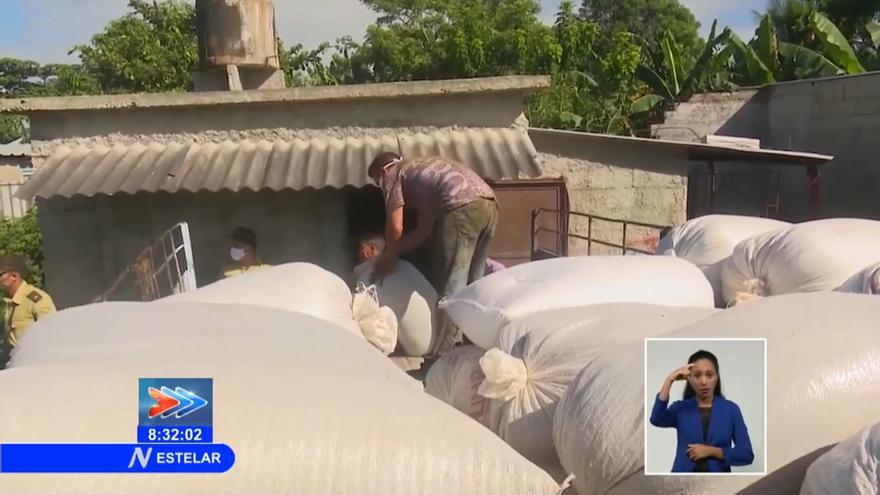
![]() 14ymedio, Havana, 28 October 2020 — Cuban State Television News once again dedicated space this Tuesday to the case against a main in Sancti Spíritus who had a storeroom with over 30,000 pounds of beans for sale on the black market.
14ymedio, Havana, 28 October 2020 — Cuban State Television News once again dedicated space this Tuesday to the case against a main in Sancti Spíritus who had a storeroom with over 30,000 pounds of beans for sale on the black market.
It is the most recent case of an arrest for illegal economic activity, a crime which the authorities have put under the media spotlight during the pandemic, in order to hold hoarders and coleros (people who stand in lines for others) responsible for the shortages and issue a clear warning to those who decide to take that road.
Between last July and until mid-September, 312 people have been punished, 106 of them with deprivation of liberty or correctional work with internment, most of them prosecuted for the crime of illicit economic activity. Another 1,360 trials were held before June 4.
Two searches were carried out on the detainee after the operation broadcast on Tuesday, one in a warehouse where he had 30,600 pounds of red beans, 440 pounds of black beans and 660 pounds of rice. In the second, carried out in his home, they found 135 liters of diesel fuel, 105 liters of motor oil and other unspecified products. For all this he will e charged with the crime of hoarding. In addition, 34,765 pesos and 1,051 convertible pesos of unknown origin were also seized.
“This citizen acquired these goods by buying them from different producers on the black market of the province and others. He had two sources in the agricultural market, which he paid according to the sales he made, and he sold them at different prices,” explained an official on television.
The agent added that there are two points of sale in the market for the sale of beans at a prices capped by the government of 12 pesos per pound, while the detainee was offering them at 25 and 30 pesos per pound.
The courts have not stopped working, despite the pandemic, to “confront this scenario” where those “responsible deserve proportionally rigorous and severe criminal responses,” said Maricela Sosa Ravelo, vice president of the Supreme People’s Court (TSP) speaking to the official Bohemia magazine, offering the data of these economic crimes. The official pointed out that 206 people who were prosecuted and “accessory sanctions” were imposed.
In recent months, according to Sosa Ravelo, there has been an increase in coleros, hoarders and resellers whom he called “people of low moral and social status, with total lack of scruples.”
The Government also focused its radar on “individuals dedicated to the illicit exchange of currencies,” and this is confirmed by the reports in the official media that include police operations against those who are dedicated to selling dollars and other currencies on the black market. Sosa Ravelo specified that of these criminal acts “have not yet been filed in the courts.”
In Havana, example-setting trials of those arrested have multiplied for allegedly violating the measures decreed to stop COVID-19. In the capital alone, between September 1 and 20, the Government had imposed fines in excess of 20 million pesos. Several residents of the capital denounced on digital platforms that some people were arrested in parks and streets, others were fined and spent a few hours in the dungeons of police units for standing in front of the door of their own house without a mask.
Since August, citizen complaints on social networks and independent media have grown about fines for breaching new restrictions against the pandemic, mainly for wearing the mask incorrectly or taking it off to talk on the phone. Even Bohemia cited one of these cases in which a citizen received a year of deprivation of liberty when accused of “propagation of epidemics” after having previously been sanctioned for “disobedience in the Covid-19 pandemic.”
However, many citizens also reproach the attitude of the authorities when sanctioning those who supply others with those products that the Government is unable to supply. Recently, Cuban Television received several criticisms for the broadcast of a report on the arrest of another informal vendor from Pinar del Río.
“Commerce must be in private hands, and they will see how every product appears. Because if there can be everything in the capitalist countries, it is precisely because of that, the freedom of trade. Although good, freedom under a dictatorship is an impossible thing,” denounced an internet user who considered a fine the maximum penalty that should be imposed against someone who supplies “what the Government does not allow people who do not receive dollars to buy.”
“It’s funny because later they talk about the [American] blockade that prevents the Government from being able to import and undertake international transactions, but the Cuban people are forbidden to import commercially and the government itself regulates personal imports with very high tariffs,” denounced another user who wondered: “So you intend to end the shortage by harassment and confiscating the products that Cubans manage to get into the island?”
____________
COLLABORATE WITH OUR WORK: The 14ymedio team is committed to practicing serious journalism that reflects Cuba’s reality in all its depth. Thank you for joining us on this long journey. We invite you to continue supporting us by becoming a member of 14ymedio now. Together we can continue transforming journalism in Cuba.
